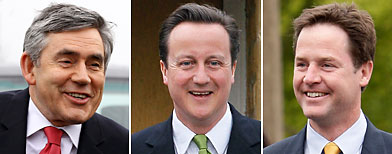On the morning after the British election Yahoo ran a headline that read, “‘Political vacuum’ sparks market jitters”. Just what we need after the Dow does a stomach tossing dive.

Should ‘market jitters’ indeed be a cause for concern after a day when the market plummeted? Yes in the sense that it has the potential of further destabilizing the already dicey European markets. But… My local paper ran a headline about yesterday’s Dow fiasco that read, “Dow plunges on Greek crisis, P&G sell order.” Truth–the market plunged because those events apparently triggered a bunch of algorithmic computer-driven sell orders that effectively fed upon each other and that is what really caused the market to plunge. In other words, a bunch of computers came perilously close to plunging the already fragile world economy into a death spiral.
For months now, I’ve been trying to understand how the market could keep going up when down here on the ground, things basically suck. Too many of us are poor, hungry, unemployed, sick and homeless. There is a huge disconnect between the health of the DOW and the health of the economy. What really hasn’t been discussed in depth yet is the impact of the mounting number of huge natural and unnatural disasters on our economic equilibrium; the utter destruction of entire countries in the aftermath of earthquakes, volcanoes that cost the airlines billions and utterly disrupt the transport system that we have become dependent upon.
And now the British Petroleum/Haliburton trashing of the Gulf of Mexico. A look at the long-term impact of the Exxon Valdez spill is instructive:
Three years after the 11 million-gallon spill in Prince William Sound blackened 1,500 miles of Alaska coastline, the herring on which he and other Cordova fishermen heavily relied disappeared from the area. Platt and some others stuck around, fishing for salmon and hoping things would improve.
The herring never returned to Cordova. Platt’s income plummeted, severely straining his marriage and psyche. He dipped into his sons’ college funds to support his family…
…The herring loss alone has cost the region about $400 million over the past 21 years, according to R.J. Kopchak, a former fisherman who is now developmental director at Cordova’s Prince William Sound Science Center.
The average fisherman suffered a 30 percent loss in income after the spill, but those who specialized in just herring lost everything, Kopchak said.
It is a fair assumption that tourism dollars will plummet along the Gulf and maybe up the eastern seaboard, unemployment in those states will rise, and if you take fish oil for your heart, the price is going up. And then there is the price that cannot be calculated for destroying ocean and wetland habitats, damage that can never be undone.

There are lessons to be learned from oil slicks that spiral out of control and computer programs that take off on their own (shades of Stanley Kubrick’s HAL) and make no mistake about it, these things are going to keep happening but unlike a roller coaster where you know that after the big plunge, the ride will go back up, here on planet Earth, there is no such guarantee. Time to fasten our seatbelts.